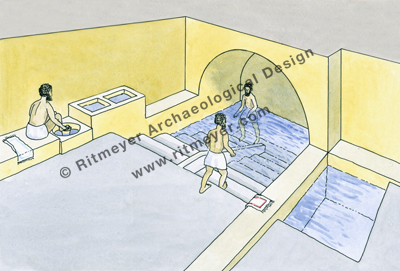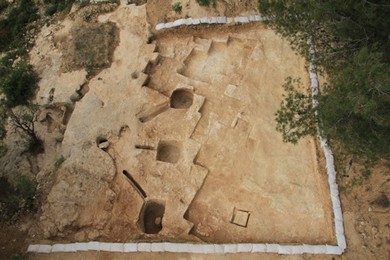Today’s Jerusalem Post reports:
An archaeological excavation conducted by the Israel Antiquities Authority near a highway construction site in the Kiryat Menachem neighborhood of Jerusalem, unearthed a rare ritual bath (mikve), dating back to the late Second Temple period.
Many mikva’ot – Hebrew for ritual baths, mikveh in the singular, – have been excavated in Jerusalem and elsewhere. These baths were used for purifying oneself by total immersion.
A mikveh is usually a stepped pool carved out of the rock with a small dividing wall built on the upper steps. The purpose for this was to descend on one side and, after immersion, ascend on the other side, thus preventing contact with those who were not yet purified.

In this drawing, a pool has been drawn to the right of the mikveh that in Hebrew is called an otzar. It is a special basin that contains pure rainwater. After the water in the main mikveh is changed, a plug in the small channel that connects the two bodies of water is briefly taken out, thereby purifying the water in the mikveh.
Benyamin Storchan, director of the excavation on behalf of the Israel Antiquities Authority, explains that the water supply to this mikve is “unique and unusual”.
“The ritual baths known until now usually consist of a closed cavity that was supplied with rainwater conveyed from a small rock-cut pool, located nearby,” he said. “The complex that was exposed at this time is a more sophisticated and intricate system. The bath was apparently associated with a settlement that was situated there in the Second Temple period.”
Storchan said the ritual bath consists of an underground chamber accessible by stairs, which received rainwater from three collecting basins situated on the roof of the bath. The pure water was then carried inside the chamber through channels.

